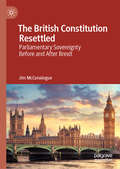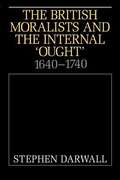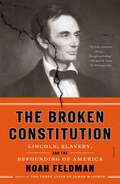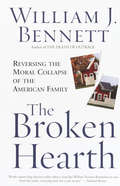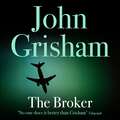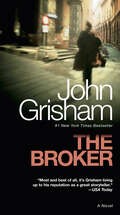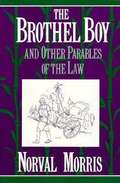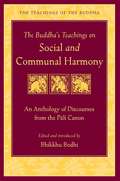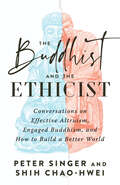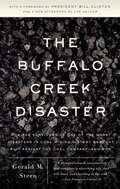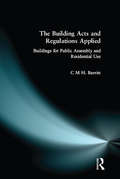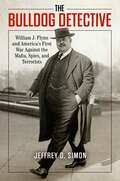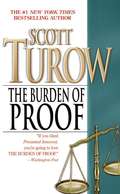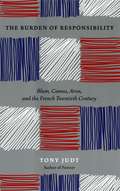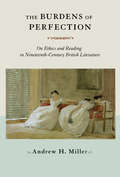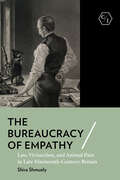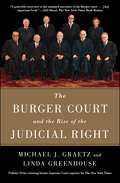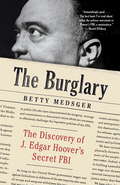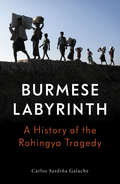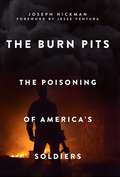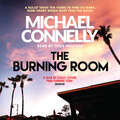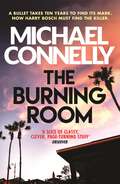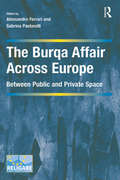- Table View
- List View
The British Constitution Resettled: Parliamentary Sovereignty Before and After Brexit
by Jim McConalogueAdopting a political constitutionalist view of the British constitution, this book critically explores the history of legal and political thought on parliamentary sovereignty in the UK. It argues that EU membership strongly unsettled the historical precedents underpinning UK parliamentary sovereignty. Successive governments adopted practices which, although preserving fundamental legal rules, were at odds with past precedents. The author uses three key EU case studies – the financial transactions tax, freedom of movement of persons, and the working time directive – to illustrate that since 1973 the UK incorporated EU institutions which unsettled those precedents. The book further shows that the parliament’s place since the referendum on Brexit in June 2016 and the scrutinising of the terms of the withdrawal agreement constitute an enhanced, new constitutional resettlement, and a realignment of parliament with the historical precedent of consent and its sovereignty.
The British Moralists and the Internal "ought", 1640-1740
by Stephen DarwallThis book is a major work in the history of ethics, and provides the first study of early modern British philosophy in several decades. Professor Darwall discerns two distinct traditions feeding into the moral philosophy of the seventeenth and eighteenth centuries. On the one hand, there is the empirical, naturalist tradition, comprising Hobbes, Locke, Cumberland, Hutcheson, and Hume, which argues that obligation is the practical force that empirical discoveries acquire in the process of deliberation. On the other hand, there is a group including Cudworth, Shaftesbury, Butler, and in some moments Locke, which views obligation as inconceivable without autonomy and which seeks to develop a theory of the will as self-determining.
The Broken Constitution: Lincoln, Slavery, and the Refounding of America
by Noah FeldmanA New York Times Book Review Editors' ChoiceAn innovative account of Abraham Lincoln, constitutional thinker and doerAbraham Lincoln is justly revered for his brilliance, compassion, humor, and rededication of the United States to achieving liberty and justice for all. He led the nation into a bloody civil war to uphold the system of government established by the US Constitution—a system he regarded as the “last best hope of mankind.” But how did Lincoln understand the Constitution?In this groundbreaking study, Noah Feldman argues that Lincoln deliberately and recurrently violated the United States’ founding arrangements. When he came to power, it was widely believed that the federal government could not use armed force to prevent a state from seceding. It was also assumed that basic civil liberties could be suspended in a rebellion by Congress but not by the president, and that the federal government had no authority over slavery in states where it existed. As president, Lincoln broke decisively with all these precedents, and effectively rewrote the Constitution’s place in the American system. Before the Civil War, the Constitution was best understood as a compromise pact—a rough and ready deal between states that allowed the Union to form and function. After Lincoln, the Constitution came to be seen as a sacred text—a transcendent statement of the nation’s highest ideals.The Broken Constitution is the first book to tell the story of how Lincoln broke the Constitution in order to remake it. To do so, it offers a riveting narrative of his constitutional choices and how he made them—and places Lincoln in the rich context of thinking of the time, from African American abolitionists to Lincoln’s Republican rivals and Secessionist ideologues.Includes 8 Pages of Black-and-White Illustrations
The Broken Hearth: Reversing the Moral Collapse of the American Family
by William J. BennettToday the American family is under siege as never before. From the dramatic rise in illegitimacy, divorce, cohabitation, and single parenthood to the call for recognition of gay marriages, the traditional nuclear family is being radically challenged and undermined, along with the moral and legal consensus that once supported it. Many think it doesn't matter whether we preserve the nuclear family. Some even argue that its dissolution is a good thing-a liberation from repressive patriarchal authority. William J. Bennett maintains that, to the contrary, the dissolution of the American family is the fundamental crisis of our time. Now, in a book as provocative and controversial as his bestsellingThe Death of Outrage, Bennett presents a timely and much-needed defense of the traditional family. Combining fearless conviction with acute insight and respect for his adversaries, Bennett offers thorough, balanced, and enlightening discussions of single parenthood, cohabitation, gay marriage, and other trends that are undercutting the ideal of the nuclear family as the essential foundation of society. Arguing that our recent economic prosperity has masked the devastating effects of this unprecedented social experimentation, Bennett traces the effects of these trends and weighs their impact on the present and future health of our society. Americans like to think they are free to reinvent every aspect of family life without social or personal consequences. Yet, far from being strictly a matter of private choice, the integrity of families is, Bennett shows, a strong and legitimate interest of society at large. And, he argues, the monogamous nuclear family is not a repressive patriarchal institution, but quite the opposite: a precious and hard-won historical achievement, one that safeguards the interests of men, women, and children as no other arrangement yet devised. Rising above the jeremiads characteristic of so much contemporary public debate,The Broken Hearthprovides a powerful affirmation of family life and the matchless benefits it bestows on individuals and society as a whole.
The Broker
by John GrishamIn his final hours in the Oval Office, the outgoing President grants a controversial last-minute pardon to Joel Backman, a notorious Washington power broker who has spent the last six years hidden away in a federal prison. What no one knows is that the President issues the pardon only after receiving enormous pressure from the CIA. It seems Backman, in his power broker heyday, may have obtained secrets that compromise the world's most sophisticated satellite surveillance system.Backman is quietly smuggled out of the country in a military cargo plane, given a new name, a new identity, and a new home in Italy. Eventually, after he has settled into his new life, the CIA will leak his whereabouts to the Israelis, the Russians, the Chinese, and the Saudis. Then the CIA will do what it does best: sit back and watch. The question is not whether Backman will survive-there is no chance of that. The question the CIA needs answered is, who will kill him?(P)2005 Random House, LLC
The Broker: A Novel
by John Grisham#1 NEW YORK TIMES BEST SELLER • In his final hours in the Oval Office, the outgoing President grants a controversial last-minute pardon to Joel Backman, a notorious Washington power broker who has spent the last six years hidden away in a federal prison. What no one knows is that the President issues the pardon only after receiving enormous pressure from the CIA. It seems Backman, in his power broker heyday, may have obtained secrets that compromise the world&’s most sophisticated satellite surveillance system. Backman is quietly smuggled out of the country in a military cargo plane, given a new name, a new identity, and a new home in Italy. Eventually, after he has settled into his new life, the CIA will leak his whereabouts to the Israelis, the Russians, the Chinese, and the Saudis. Then the CIA will do what it does best: sit back and watch. The question is not whether Backman will survive—there is no chance of that. The question the CIA needs answered is, who will kill him?Don&’t miss John Grisham&’s new book, THE EXCHANGE: AFTER THE FIRM!
The Broker: द ब्रोकर
by John Grishamराजधानीतील सत्ताधाऱ्यांमध्ये ऊठबस करणारा, सत्ताकारणात कोणाला खाली खेचायचे, कोणाला वर चढवायचे या खेळात भाग घेणारा बॅकमन, हा अनेकांची सरकारदरबारी असलेली कामे पैसे घेऊन करून द्यायचा. त्यामुळे त्याला 'दलाल' असे संबोधले जाई. काही कारणाने त्याला तुरुंगवास पत्करावा लागतो. सहा वर्षांनी त्याला माफी मिळाल्याने तो सुटून बाहेर येतो. बॅकमन सुटल्यावर त्याला अमेरिकेची केंद्रीय गुप्तचर संघटना सी. आय. ए. देशाबाहेर नेऊन ठेवते. त्याला नवीन नाव, नवीन ओळख व एक नवीन घर दिले जाते. तो आपल्या नवीन आयुष्यात स्थिर झाल्यावर त्याचा नवीन पत्ता अन्य देशांच्या गुप्तचर संस्थांना दिला जातो. कोण पुढे येऊन मारतो आहे, हे सी. आय. ए. ला ठाऊक करून घ्यायचे असते; पण या सगळ्या प्रकरणाला भलतीच कलाटणी मिळते. सी. आय. ए. च्या या योजनेची कल्पना बॅकमनला असते का, या योजनेला जी भलतीच कलाटणी मिळते, त्यात बॅकमनच्या अक्कलहुशारीचा भाग असतो का, या प्रश्नांची उत्तरे जाणून घेण्यासाठी 'द ब्रोकर' वाचलंच पाहिजे. 'पुढे काय झाले' ही उत्सुकता ग्रिशॅमने कायम ठेवली आहेच.
The Brothel Boy And Other Parables Of The Law
by Norval MorrisThe mystery does not always end when the crime has been solved. Indeed, the most insolvable problems of crime and punishment are not so much who committed the crime, but how to see that justice is done. Now, in this illuminating volume, one of America's great legal thinkers, Norval Morris,addresses some of the most perplexing and controversial questions of justice in a highly singular fashion--by examining them in fictional form, in what he calls "parables of the law." The protagonist of these stories, the figure who must see that justice is done, is Eric Blair, a name familiar to most readers: it's the real name of George Orwell. In fact, Morris has set his tales in the time and place of Orwell's famous essay, "Shooting an Elephant," in Moulmein, Burma, in the 1920s. What might seem a curious strategy at first glance--borrowing Orwell's persona to narrate these tales--is actually a brilliant stroke. For in Eric Blair we have an ideal narrator to highlight the complexities of justice: an untrained police lieutenant and junior magistrate, uncertain of judgement--and all the more likely to anguish over judgement, and to examine every facet of a case before deciding. And in 1920s Moulmein we have a neutral time and space in which to consider--free of our own political, religious, or social prejudices--a set of contemporary legal and moral questions that rarely find so calm an arena. And these stories certainly address some highly charged issues--capital punishment, insanity as a murder defense, the "battered wife syndrome" as a murder defense, child custody, "parental neglect" due to religious conviction--to name a few. In each tale, Norval Morris excels at placing Blair at the center of a controversy that has no easy answer, and that he and he alone must decide. In the title story, for instance, a retarded boy, whose only understanding of sex comes from the brothel in which he works, accidentally murders a young girl while raping her,his only defense being "Please sir, I paid her. " Blair can see that the boy doesn't realize that he has committed a crime, but both the Burmese and the European community of Moulmein demand the boy's execution. Does capital punishment make sense in such an instance? Does it ever make sense? To broaden our understanding of these intricate cases, Morris concludes each story with a perceptive and often provocative commentary on each issue. After "Brothel Boy," for instance, Morris points out that no reputable study has ever shown capital punishment to be an effective deterrent to future murders, and more surprisingly, that paroled murderers commit proportionately fewer homicides than paroled felons who used a firearm in the commission of their crime. Norval Morris is one of America's foremost experts on crime and punishment, and the stories collected here represent the culmination of a lifetime of thought on the major criminal law debates of our time. A reader of these tales will come away with a deeper understanding of these debates and with a profound respect for the intricacies of justice and the complexity of the law.
The Buddha's Teachings on Social and Communal Harmony: An Anthology of Discourses from the Pali Canon
by His Holiness the Dalai Lama Bhikkhu BodhiIn a world of conflict and strife, how can we be advocates of peace and justice? In this volume acclaimed scholar-monk Bhikkhu Bodhi has collected and translated the Buddha's teachings on conflict resolution, interpersonal and social problem-solving, and the forging of harmonious relationships. The selections, all drawn from the Pali Canon, the earliest record of the Buddha's discourses, are organized into ten thematic chapters. The chapters deal with such topics as the quelling of anger, good friendship, intentional communities, the settlement of disputes, and the establishing of an equitable society. Each chapter begins with a concise and informative introduction by the translator that guides us toward a deeper understanding of the texts that follow. In times of social conflict, intolerance, and war, the Buddha's approach to creating and sustaining peace takes on a new and urgent significance. Even readers unacquainted with Buddhism will appreciate these ancient teachings, always clear, practical, undogmatic, and so contemporary in flavor. The Buddha's Teachings on Social and Communal Harmony will prove to be essential reading for anyone seeking to bring peace into their communities and into the wider world.
The Buddhist and the Ethicist: Conversations on Effective Altruism, Engaged Buddhism, and How to Build a Better World
by Peter Singer Shih Chao-HweiEastern spirituality and utilitarian philosophy meet in these unique dialogues between a Buddhist monastic and a moral philosopher on such issues as animal welfare, gender equality, the death penalty, and moreAn unlikely duo—Professor Peter Singer, a preeminent philosopher and professor of bioethics, and Venerable Shih Chao-Hwei, a Taiwanese Buddhist monastic and social activist—join forces to talk ethics in lively conversations that cross oceans, overcome language barriers, and bridge philosophies. The eye-opening dialogues collected here share unique perspectives on contemporary issues like animal welfare, gender equality, the death penalty, and more. Together, these two deep thinkers explore the foundation of ethics and key Buddhist concepts, and ultimately reveal how we can all move toward making the world a better place.
The Buffalo Creek Disaster: How the survivors of one of the worst disasters in coal-mining history brought s uit against the coal company--and won
by Gerald M. SternOne Saturday morning in February 1972, an impoundment dam owned by the Pittston Coal Company burst, sending a 130 million gallon, 25 foot tidal wave of water, sludge, and debris crashing into southern West Virginia's Buffalo Creek hollow. It was one of the deadliest floods in U.S. history. 125 people were killed instantly, more than 1,000 were injured, and over 4,000 were suddenly homeless. Instead of accepting the small settlements offered by the coal company's insurance offices, a few hundred of the survivors banded together to sue. This is the story of their triumph over incredible odds and corporate irresponsibility, as told by Gerald M. Stern, who as a young lawyer and took on the case and won.From the Trade Paperback edition.
The Building Acts and Regulations Applied: Buildings for Public Assembly and Residential Use
by C.M.H. BarrittThis book forms part of a unique, highly practical and time-saving three volume presentation of the Building Regulations, each book covering all the regulations relating to specific building usage. The chapters of each volume form self-contained units covering all the Regulation requirements applicable to a particular part of a building; thus the reader can ensure that all the Regulations are fully met. Also included is a digest of published standards, guides and technical information as well as reviews of the new Eurocodes currently being introduced.The Building Acts and Regulations Applied: Buildings for Public Assembly and Residential Use covers all the regulations relating to buildings used for public assembly or residential purposes (other than houses and flats), such as theatres, sports stadia, hotels, prisons and halls of residence. It is a useful course companion for BTEC HNC/D and degree courses in building, architecture, surveying, estate management and other built environment disciplines. It is also an ideal reference source for all professionals working in these areas.
The Bulldog Detective: William J. Flynn and America's First War Against the Mafia, Spies, and Terrorists
by Jeffrey D. SimonAmerica in the early twentieth century was rife with threats. Organized crime groups like the Mafia, German spies embedded behind enemy lines ahead of World War I, package bombs sent throughout the country, and the 1920 Wall Street bombing dominated headlines. Yet the story of the one man tasked with combating these threats has yet to be told. The Bulldog Detective: William J. Flynn and America&’s First War Against the Mafia, Spies, and Terrorists is the first book to tell the story of Flynn, the first government official to bring down the powerful Mafia, uncover a sophisticated German spy ring in the United States, and launch a formal war on terrorism on his way to becoming one of the most respected and effective law enforcement officials in American history.Long before Eliot Ness and the Untouchables went after Al Capone and the Italian mob in Chicago, Flynn dismantled the first Mafia family to exist in America. Next stop for the indefatigable crime fighter would be Chief of the Secret Service where he would set his crosshairs on the country&’s most notorious currency counterfeiters. Coined &“the Bulldog&” for his tenacity, Flynn&’s fame soared as he exposed Kaiser Germany&’s sophisticated spy and sabotage ring on the cusp of America&’s entry into World War I. As the Director of the Bureau of Investigation (the forerunner of the FBI), the Bulldog would devise the first counterterrorist strategy in U.S. history. In this riveting biography, author Jeffrey D. Simon brings to life the forgotten saga of one of America&’s greatest crime and terrorist fighters. Exquisitely researched, The Bulldog Detective finally uncovers the important legacy of this fascinating man who will now no longer be lost in history.
The Burden of Proof
by Scott TurowLegal thriller following some of the personal problems of Sandy Stern, the defense lawyer from Turow's first novel. Family drama and financial intrigue.
The Burden of Responsibility: Blum, Camus, Aron, and the French Twentieth Century
by Tony JudtA historian explores how three noted French intellectuals maintained their moral principles despite the difficult political pressures of their era.Through the prism of the lives three outstanding twentieth century French intellectuals—Leon Blum, Albert Camus, and Raymond Aron—history professor Tony Judt examines pivotal issues in the history of contemporary French society—antisemitism and the dilemma of Jewish identity, political and moral idealism in public life, the Marxist moment in French thought, the traumas of decolonization, the disaffection of the intelligentsia, and the insidious quarrels rending Right and Left. Judt focuses particularly on Blum's leadership of the Popular Front and his stern defiance of the Vichy governments, on Camus's part in the Resistance and Algerian War, and on Aron's cultural commentary and opposition to the facile acceptance by many French intellectuals of communism's utopian promise. Severely maligned by powerful critics and rivals, each of these exemplary figures stood fast in their principles and eventually won some measure of personal and public redemption.Judt constructs a compelling portrait of modern French intellectual life and politics. He challenges the conventional account of the role of intellectuals precisely because they mattered in France, because they could shape public opinion and influence policy. In Blum, Camus, and Aron, Judt finds three very different men who did not simply play the role, but evinced a courage and a responsibility in public life that far outshone their contemporaries.“An eloquent and instructive study of intellectual courage in the face of what the author persuasively describes as intellectual irresponsibility.” —New York Times“An admirable account and also an excellent introduction for those coming to the subject, complete with 'further readings.'” —Los Angeles Times Sunday Book Review
The Burdens of Perfection: On Ethics and Reading in Nineteenth-Century British Literature
by Andrew H. MillerLiterary criticism has, in recent decades, rather fled from discussions of moral psychology, and for good reasons, too. Who would not want to flee the hectoring moralism with which it is so easily associated-portentous, pious, humorless? But in protecting us from such fates, our flight has had its costs, as we have lost the concepts needed to recognize and assess much of what distinguished nineteenth-century British literature. That literature was inescapably ethical in orientation, and to proceed as if it were not ignores a large part of what these texts have to offer, and to that degree makes less reasonable the desire to study them, rather than other documents from the period, or from other periods.Such are the intuitions that drive The Burdens of Perfection, a study of moral perfectionism in nineteenth-century British culture. Reading the period's essayists (Mill, Arnold, Carlyle), poets (Browning and Tennyson), and especially its novelists (Austen, Dickens, Eliot, and James), Andrew H. Miller provides an extensive response to Stanley Cavell's contribution to ethics and philosophy of mind. In the process, Miller offers a fresh way to perceive the Victorians and the lingering traces their quests for improvement have left on readers.
The Burdens of Proof
by Dale A. NanceAdjudicative tribunals in both criminal and non-criminal cases rely on the concept of the 'burden of proof' to resolve uncertainty about facts. Perhaps surprisingly, this concept remains clouded and deeply controversial. Written by an internationally renowned scholar, this book explores contemporary thinking on the evidential requirements that are critical for all practical decision-making, including adjudication. Although the idea that evidence must favor one side over the other to a specified degree, such as 'beyond reasonable doubt', is familiar, less well-understood is an idea associated with the work of John Maynard Keynes, namely that there are requirements on the total amount of evidence considered to decide the case. The author expertly explores this distinct Keynesian concept and its implications. Hypothetical examples and litigated cases are included to assist understanding of the ideas developed. Implications include an expanded conception of the burden of producing evidence and how it should be administered.
The Bureaucracy of Empathy: Law, Vivisection, and Animal Pain in Late Nineteenth-Century Britain (Corpus Juris: The Humanities in Politics and Law)
by Shira ShmuelyThe Bureaucracy of Empathy revolves around two central questions: What is pain? And how do we recognize, understand, and ameliorate the pain of nonhuman animals? Shira Shmuely investigates these ethical issues through a close and careful history of the origins, implementation, and enforcement of the 1876 Cruelty to Animals Act of Parliament, which for the first time imposed legal restrictions on animal experimentation and mandated official supervision of procedures "calculated to give pain" to animal subjects.Exploring how scientists, bureaucrats, and lawyers wrestled with the problem of animal pain and its perception, Shmuely traces in depth and detail how the Act was enforced, the medical establishment's initial resistance and then embrace of regulation, and the challenges from anti-vivisection advocates who deemed it insufficient protection against animal suffering. She shows how a "bureaucracy of empathy" emerged to support and administer the legislation, navigating incongruent interpretations of pain. This crucial moment in animal law and ethics continues to inform laws regulating the treatment of nonhuman animals in laboratories, farms, and homes around the worlds to the present.
The Burger Court and the Rise of the Judicial Right
by Linda Greenhouse Michael J. GraetzA fresh and revelatory look at the Warren Burger Supreme Court finds that it was not a "moderate" or transitional court, as often portrayed, but a conservative one that still defines the constitutional landscape we live in today.When Richard Nixon campaigned for the presidency in 1968 he promised to change the Supreme Court. With four appointments to the court, including Warren E. Burger as the chief justice, he did just that. In 1969, the Burger Court succeeded the famously liberal Warren Court, which had significantly expanded civil liberties and was despised by conservatives across the country. The Burger Court is often described as a "transitional" court between the liberal Warren Court and the Rehnquist and Roberts Courts, a court where little of importance happened. But as Michael J. Graetz and Linda Greenhouse show, the Burger Court veered well to the right in such areas as criminal law, race, and corporate power. Even while declaring a right to abortion in Roe v. Wade, it drew the line at government funding for poor women. The authors excavate the roots of the most significant Burger Court decisions and show how their legacy affects us today. The most comprehensive evaluation of the Burger Supreme Court ever written for a general audience, The Burger Court and the Rise of the Judicial Right draws on the personal papers of the justices as well as other archives to reveal how the Court shaped its major decisions. It will surprise even legal scholars and historians with its insights into a period that has received too little attention from either.
The Burglary
by Betty MedsgerThe never-before-told full story of the 1971 history-changing break-in of the FBI offices in Media, Pennsylvania, by a group of unlikely activists--quiet, ordinary, hardworking Americans--that made clear the shocking truth and confirmed what some had long suspected, that J. Edgar Hoover had created and was operating his own shadow Bureau of Investigation.The book shows how the break-in, and subsequent release of the contents of the FBI's files to newspapers across the country, upended the public's perception of the up-till-then inviolate head of the Bureau, paving the way for the FBI's overhaul for the first time since its inception forty-seven years before, in 1924, and setting the stage for the sensational release three months later by Daniel Ellsberg of the top-secret seven-thousand-page Pentagon study of U.S. decision making regarding the Vietnam War that became known as the Pentagon Papers.
The Burmese Labyrinth
by Carlos Sardina GalacheA first-hand account of the complex, bloody history of Myanmar and the origins of the ethnic cleansing of the RohingyasIn 2011, Myanmar embarked in a democratic transition from a brutal military rule that culminated four years later, when the first free election in decades saw a landslide for the party of celebrated Nobel Prize winner Aung San Suu Kyi. Yet, even as the international community was celebrating a new dawn, old wars were raging in the northern borderlands. A crisis was emerging in western Arakan state where the regime intensified its oppression of the vulnerable Muslim Rohingya community. By 2017, the conflict had escalated into a military onslaught against the Rohingya that provoked the most desperate refugee crisis of our times, as over 750,000 of them fled their homes to neighbouring Bangladesh.In The Burmese Labyrinth, journalist Carlos Sardiña Galache gives the in depth story of the country. Burma has always been an uneasy balance between multiple ethnic groups and religions. He examines the deep roots behind the ethnic divisions that go back prior to the colonial period, and so shockingly exploded in recent times. This is a powerful portrait of a nation in perpetual conflict with itself.
The Burn Pits: The Poisoning of America's Soldiers
by Joseph Hickman“There’s a whole chapter on my son Beau… He was co-located [twice] near these burn pits.”–Joe Biden, former Vice President of the United States of AmericaThe Agent Orange of the 21st Century… Thousands of American soldiers are returning from the battlefields of Iraq and Afghanistan with severe wounds from chemical war. They are not the victims of ruthless enemy warfare, but of their own military commanders. These soldiers, afflicted with rare cancers and respiratory diseases, were sickened from the smoke and ash swirling out of the “burn pits” where military contractors incinerated mountains of trash, including old stockpiles of mustard and sarin gas, medical waste, and other toxic material.This shocking work, now for the first time in paperback, includes: Illustration of the devastation in one soldier’s intimate story A plea for help Connection between the burn pits and Major Biden’s unfortunate suffering and death The burn pits’ effects on native citizens of Iraq: mothers, fathers, and children Denial from the Department of Defense and others Warning signs that were ignored and much moreBased on thousands of government documents, over five hundred in-depth medical case studies, and interviews with more than one thousand veterans and active-duty GIs, The Burn Pits will shock the nation. The book is more than an explosive work of investigative journalism—it is the deeply moving chronicle of the many young men and women who signed up to serve their country in the wake of 9/11, only to return home permanently damaged, the victims of their own armed forces’ criminal negligence.
The Burning Room (Harry Bosch Series #17)
by Michael ConnellyLos Angeles Detective Harry Bosch tackles a cold case unlike any he's ever worked, in the new legal thriller from the bestselling author of THE LINCOLN LAWYER and THE BLACK ECHO, Michael Connelly.In the LA Police's Open-Unsolved Unit, not many murder victims die almost a decade after the crime. So when a man succumbs to complications from being shot by a stray bullet ten years earlier, Bosch catches a case in which the body is still fresh, but any other evidence is virtually non-existent.Now Bosch and his new partner, rookie Detective Lucia Soto, are tasked with solving what turns out to be a highly charged, politically sensitive case. Starting with the bullet that's been lodged for years in the victim's spine, they must pull new leads from years-old information, which soon reveals that this shooting may have been anything but random in this gripping police procedural.
The Burning Room (Harry Bosch Series #17)
by Michael ConnellyLos Angeles Detective Harry Bosch tackles a cold case unlike any he's ever worked, in the new legal thriller from the bestselling author of THE LINCOLN LAWYER and THE BLACK ECHO, Michael Connelly.In the LA Police's Open-Unsolved Unit, not many murder victims die almost a decade after the crime. So when a man succumbs to complications from being shot by a stray bullet ten years earlier, Bosch catches a case in which the body is still fresh, but any other evidence is virtually non-existent.Now Bosch and his new partner, rookie Detective Lucia Soto, are tasked with solving what turns out to be a highly charged, politically sensitive case. Starting with the bullet that's been lodged for years in the victim's spine, they must pull new leads from years-old information, which soon reveals that this shooting may have been anything but random in this gripping police procedural.
The Burqa Affair Across Europe: Between Public and Private Space (Cultural Diversity and Law in Association with RELIGARE)
by Alessandro Ferrari Sabrina PastorelliIn recent years, the wearing of the full-face veil or burqa/niqab has proved a controversial issue in many multi-cultural European societies. Focussing on the socio-legal and human rights angle, this volume provides a useful comparative perspective on how the issue has been dealt with across a range of European states as well as at European institutional level. In so doing, the work draws a theoretical framework for the place of religion between public and private space. With contributions from leading experts from law, sociology and politics, the book presents a comparative and interdisciplinary approach to one of the most contentious and symbolic issues of recent times.
